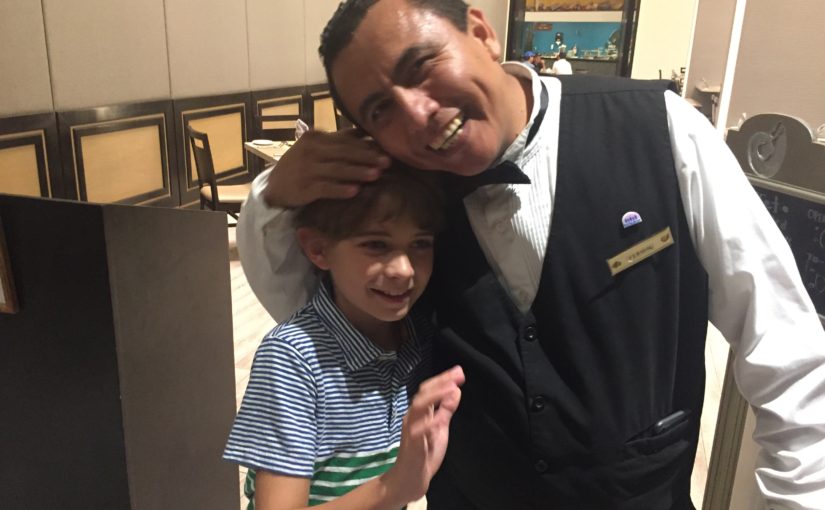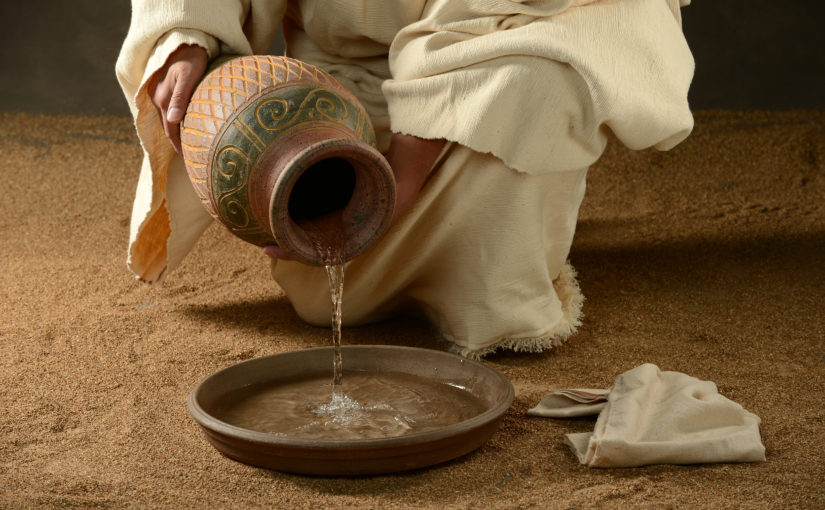Today’s Reading: 2 Chronicles 1; 1 John 1; Micah 7; Luke 16
In last week’s post, I briefly mentioned being thankful for the person who found and turned in Preston’s iPod. This was no small event; we were in a foreign country at a large resort where there were literally thousands of employees and thousands of guests from around the globe. Preston’s iPod isn’t extremely valuable financially, but it is worth a lot to him. He can’t afford to buy a replacement, and Amy and I would have needed to let him learn his lesson in being responsible.
One who is faithful in a very little is also faithful in much, and one who is dishonest in a very little is also dishonest in much. (Luke 16:10)
Preston gave his new hero (Fermin) a small token of his appreciation, a hug, and verbal thanks. Based on Luke 16 I wonder if perhaps Fermin was being tested with very little and reaped Heavenly rewards for his decision. Fermin was beaming with a huge smile when Preston found him to say thank you. I think that Fermin experienced as much, or more joy than Preston through this experience.
While this exact situation isn’t something that occurs daily for any of us, it does make me think about what we are entrusted with each day:
- Showing up late for work and not making up for it or logging the time inaccurately is stealing. Even if it was just 15 minutes and the employer may never find out, God knows.
- How we spend our money. If I look at my accounts, what do they reflect? Should I be entrusted with more or less money based on how I’ve allocated the resources entrusted to me?
- Time; our only non-renewable resource. What did I do in my free-time, and what does my calendar say about how I’m choosing to spend this precious gift?
This section of Luke closes with a blunt statement in Luke 16:13 that should challenge us to our core. Do we serve God or do we serve money? The choice is ours to make, and only God knows our true intentions; he knows how we spend our time, money, and energy. Coming from a wonderful week of vacation with my family, I’m exceedingly thankful for the rest, relaxation, and special days and nights with my favorite people on Earth. In reflection, did I make the most of this time, and did I behave as one who loves money or one who loves God?
Think about what Jesus was entrusted with. He came to Earth as a human baby, but with authority over Heaven and Earth. If I could turn water into wine like Jesus did, it is shameful what I’d do… God knows how much (or little) I can be entrusted with! In Matthew 4:1-11 Jesus is tempted by the devil. This includes significant examples of how much Jesus was entrusted with. Also consider that since the devil was trying to temp Jesus, he knew Jesus had the power to do those things, which is further proof of the deity of Jesus Christ.
Father God, may my checkbook, calendar, and heart be filled with more of you and less of me each day. Thank you for giving me such a multitude of second chances. Amen.







 Sunrises, sunsets, kids giggling, sight, the sound of water making its way through rocks, changes in seasons, changes in temperature, the smell of the air that signifies rain is coming, light breezes, the multitude of creatures that roam this earth in so many ways; flight, crawling, galloping, swimming, prancing, sprinting, steadily pacing. The fact that Earth is a perfect distance from the sun, our air has the right amount of oxygen. Our bodies consume food and water as sustaining energy. Coffee, pizza, tacos, rare beef, spices and recipes from around the world. India Pale Ales, carbonated water, crunchy potato chips, avocados, and salsa. Bicycles, good running shoes, flip flops, polarized sunglasses. Parents, grandparents, siblings, cousins, aunts, uncles, teachers, and the warm feeling that goes with the word “family”, whether through genetic or the various human relationships. Those who have sacrificed their lives for our country as well as those who have given their lives to further the gospel; we’re all recipients of this in some way.
Sunrises, sunsets, kids giggling, sight, the sound of water making its way through rocks, changes in seasons, changes in temperature, the smell of the air that signifies rain is coming, light breezes, the multitude of creatures that roam this earth in so many ways; flight, crawling, galloping, swimming, prancing, sprinting, steadily pacing. The fact that Earth is a perfect distance from the sun, our air has the right amount of oxygen. Our bodies consume food and water as sustaining energy. Coffee, pizza, tacos, rare beef, spices and recipes from around the world. India Pale Ales, carbonated water, crunchy potato chips, avocados, and salsa. Bicycles, good running shoes, flip flops, polarized sunglasses. Parents, grandparents, siblings, cousins, aunts, uncles, teachers, and the warm feeling that goes with the word “family”, whether through genetic or the various human relationships. Those who have sacrificed their lives for our country as well as those who have given their lives to further the gospel; we’re all recipients of this in some way. For the joy that ice cream and treats bring to children; for the ability to watch them enjoy such things. For the truth filters that we’re given; for the truth we receive from God Almighty. Thankful that somehow in my wandering I realized God’s ways are good, that he cannot tolerate sin, that he sent his son Jesus to atone for our sin. For the cleansing water of baptism. For the Bible as a complete work of divine literature as a guide for our daily lives. For the Holy Spirit who speaks to us and gives us words.
For the joy that ice cream and treats bring to children; for the ability to watch them enjoy such things. For the truth filters that we’re given; for the truth we receive from God Almighty. Thankful that somehow in my wandering I realized God’s ways are good, that he cannot tolerate sin, that he sent his son Jesus to atone for our sin. For the cleansing water of baptism. For the Bible as a complete work of divine literature as a guide for our daily lives. For the Holy Spirit who speaks to us and gives us words.
